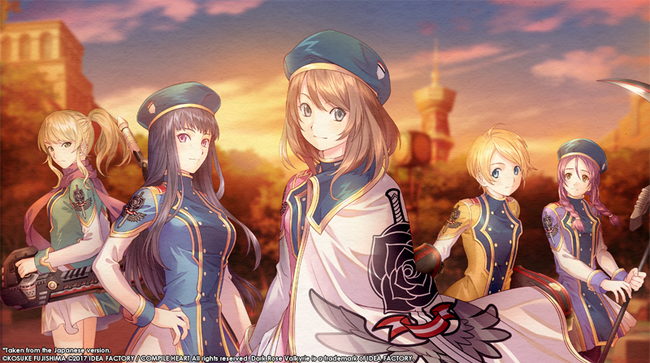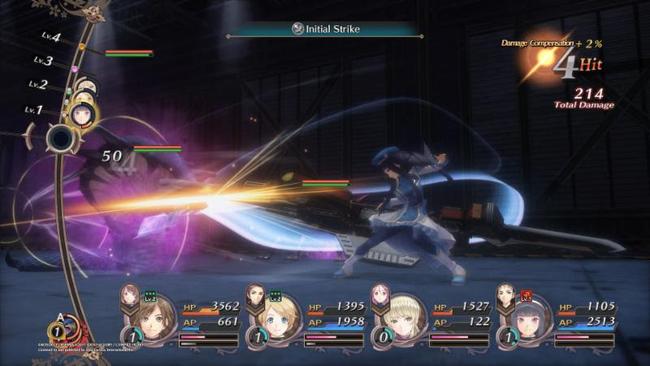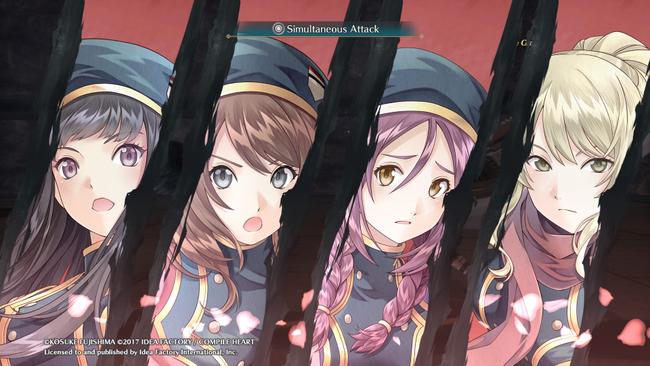
Dark Rose Valkyrie Review
Sometimes, when you start up Dark Rose Valkyrie, the game's protagonist will say, “Guess it’s time to look for some cute girls.” He probably says this because it is one of the few things this game has going for it.
Dark Rose Valkyrie is the latest game from Compile Heart, the developer studio best known for the Hyperdimension Neptunia series. While this game contains some of the fanservice that Compile Heart’s other titles are known for, it’s an attempt at a darker and more grounded franchise. It’s an RPG and visual novel hybrid that, in spite of how interesting this concept sounds, lacks any enticing moments. It doesn’t excel as a traditional RPG nor as a visual novel; instead, it’s an awkward mix of the two that quickly becomes repetitive and dull in spite of its potential.
One of the reasons as to why Dark Rose Valkyrie piqued my interest is because of its intriguing premise. The story takes place in an alternate version of Japan in which a meteorite dubbed The Black Garnet collided into our planet and brought about the Chimera virus. Infecting both humans and animals, the virus has completely reconstructed their bodies and killed over 3% of the world’s population. You take control of Asahi Shiramine, the new captain of the Special Force Valkyrie, a team dedicated to fighting the spread of the Chimera virus.

The members of this team are all girls who fit very typical anime archetypes. The small and quiet girl; the loud and lively tomboy; the nice girl with a strong will; the overly well-mannered girl; the serious and stoic girl; later on, the shy girl with glasses - it’s nothing you haven’t seen before. They’re a likable enough bunch, but they never step too far enough outside their archetypes to stand out.
The twist is that among them, there is a traitor who has been infected with the Chimera virus and is leaking information to the enemy. In order to find this traitor, you’re able to hold interviews with your team members to spot inconsistencies in what they say. Unfortunately, the interrogation segment of the game feels more like a restrictive mini-game rather than serious detective work because you can only ask a few questions among all your team members. Considering that the interviews affect your ending, it makes little sense for them to be so limited and your investigation to feel so superficial.
The game contains two sections: one in which you’ll chat with your subordinates at your team's military base and one in which you’ll traverse dungeons. These dungeons are composed of narrow and empty corridors that lead to more open yet equally empty areas, and throughout this you will find monsters to engage in battle.
This is a turn-based RPG, and from the early moments it feels like every turn overstays its welcome. You can damage enemies through two methods. One method is by using regular melee attacks, which aren't your strongest options and can take long to execute because they consist of characters slowly shooting or swinging their weapons at an enemy several times. Melee attacks can lead to powerful combos once an enemy’s guard has been broken, but those only further increase the attack duration. At one point, two characters performing a combo consisting of regular melee attacks took around forty seconds to finish their turns; the enemy's health had reached zero by the sixth second.
Thankfully, the game lets you skip a lot of the action with the press of a button, as if it's offering you some mercy because it knows you’ll get bored of pressing the same buttons and seeing the same moves over and over again. But skipping takes its own bit of time as you have to button mash through all the lengthy sequences, and the fact that I resorted to it early on highlights how unenjoyable the battles can feel from the beginning. I would’ve appreciated if your characters could attack in swift moves that would've taken a few seconds to execute, making battles faster and more fluid.

If you want to fight using skills that take less time to execute and do considerably more damage than regular melee attacks, you can use Arts, which are akin to magic in this game. There are Arts that have physical elements like bullets, swords, and missiles in addition to the familiar RPG elements like fire, ice, and lightning. It feels like the game wants you to prioritize Arts because they are the only way of exploiting an enemy’s weaknesses. However, it fails in doing this in a balanced manner, and I get the feeling that the game should have focused on this component of the battle system over everything else.
The issue with Arts is that unlike regular attacks, they take a certain amount of Ability Points (AP) to be used in battle. Most Arts cost around 200-300 AP, but there are many that cost 400-500, and special ones can cost up to 900 AP. I was twenty hours into the game and all my characters still had a bank of 2000-2500 AP, so during a boss battle it wasn’t long before I ran out of AP and could only perform melee attacks.
I extended my resources through using dozens of AP items and switching between the four frontline party members and the four backline members, but this broke up the pacing and it was a chore to strategize my battles almost entirely around making my AP last as much as possible rather than effectively exploiting an enemy’s weakness. On the field, I felt limited in how I could only fight a few battles before I had to go back to the base to get everyone's health and AP bank automatically restored so that I could go back into the field and keep carrying out missions.
Battles became less tedious once I had enough money to keep myself stocked on the maximum AP restoration potions I could carry, but they shouldn't have taken until the midpoint of the game to become somewhat engaging. If the battle system was geared towards letting you make full use of Arts, fights would probably be quite fun; instead, they’re unbalanced and just not very entertaining. They also incorporate some unnecessary elements - like the Overdrive, Ignition, and Formation abilities - that aren’t truly worth going into detail over because they don’t have any significant impact in battle.
Just as with battles, missions are incredibly monotonous. After every relatively short development in the story, you are assigned to complete multiple missions that are always the same: analyze and kill these monsters in this dungeon; eliminate enemies during the day and night in this area; bring this amount of money; travel to this area and scout it. There’s nothing exciting to look forward to when it comes to missions, and the story sections between them are so brief that pushing yourself through the mundane and at times frustrating gameplay sections never feels rewarded. Dark Rose Valkyrie should’ve focused more on the story and a lot less on boring filler missions that, more than anything, exist to break up the pacing of the plot.

This game does well in two areas: its character art and its voice acting. The CGI screens featuring the characters are nicely drawn and contain vivid colors. The sprites in the game are lovely because each character has a beautiful design, which is to be expected of Kosuke Fujishima, who is best known for his character designs in the Tales franchise. They are slightly animated, with blinking and breathing animations that look natural and bring the characters to life. And I have to mention that the quality of the voice acting in this game is generally fantastic; each character has a voice that sounds fitting, and lines are usually delivered with the right tone. There aren't any outstanding songs in the game's soundtrack, but all of them accomplish their purpose of creating a certain atmosphere.
And yet, these good qualities don’t exist without their flaws, either. I sometimes got distracted by the poor lip movement of certain characters, especially the ones with serious personalities. While the CGI images are visually appealing, the rest of the visuals of this game are subpar. Textures for the world map and the dungeons are often of a level of quality that seems reminiscent of PlayStation 2 games. And while the voice acting is spot on, there's a particularly questionable sound design choice: whichever character you control in the field will frequently and loudly pant. This became annoying in the first ten minutes and I found it less inconvenient to simply lower the volume on my TV altogether than to constantly go into the menu and mute the character’s voice for that sole purpose.
Across its campaign of forty to fifty hours, Dark Rose Valkyrie tries to be many things and fails to excel or be memorable through any of those attempts. Perhaps it would have worked better as either a traditional RPG or as a visual novel, but it simply doesn’t work as a combination of the two. The story seems promising at first, but it’s average and marred by significant pacing issues. It stars a cast that is likable but not one that you will remember as anything groundbreaking in terms of characterization or development. Its battle system is restrictive and feels unbalanced, and as a result it makes battles have little enjoyment. The voice acting and character designs are great, but those positives aren't enough to compensate for the flaws this game has.
The year isn't over yet, but it has been wonderful for JRPGs thus far. There are giant Game of the Year contenders like Persona 5 and Legend of Zelda: Breath of the Wild, as well as smaller but well-received releases like The Legend of Heroes: Trails in the Sky the 3rd and Fire Emblem Echoes: Shadows of Valentia. With a variety of great new releases in the genre, you're better off spending all the hours this game takes to be completed by playing something better.